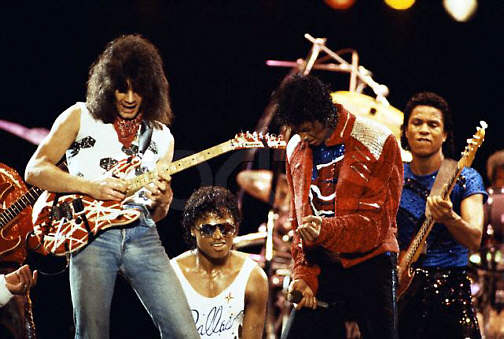How Jackson's "Thriller" changed the music business
LOS ANGELES (Billboard) - In early 1984, when Epic Records executives presented their slate of upcoming releases at the convention in Hawaii of parent company CBS Records, they couldn't resist playing up the success they were experiencing. So between the pitches for new albums, Epic inserted stock footage of semi trucks and a voice-over that thunderously announced, "There goes another load of Michael Jackson's 'Thriller' albums!"
Trucks weren't really leaving the warehouse every few minutes, but "Thriller" was still shattering expectations more than a year after its November 30, 1982, release. Epic was selling more than 1 million copies per month in the United States alone.
Nearly 27 years after its release, "Thriller" still stands as the best-selling studio album in the United States, according to the Recording Industry Association of America, which has certified it 28-times platinum. More than 50 million copies have been sold internationally, according to estimates.
But the album's success can't be measured by sales alone. As Jackson moonwalked his way into music history, "Thriller" set a new benchmark for blockbusters that changed how the music business promoted and marketed superstar releases. It also changed MTV, breaking down the cable network's racial barriers and raising the bar for video quality.
FIRST OF ITS KIND
From the beginning, Epic intended to live up to its name. The label made "Thriller" the first major release to debut worldwide simultaneously, the first album to be promoted for close to two years instead of the usual six or eight months and the first album to spin off seven singles to radio -- more than double the normal number.
Along the way, "Thriller" redefined the expectations for blockbuster releases. Starting in 1984, Columbia released seven singles from Bruce Springsteen's "Born in the U.S.A.," all of which landed in the top 10 of the Billboard Hot 100. Around the same time, Warner Bros. sent to radio five singles from Prince's "Purple Rain." Mercury found seven singles on Def Leppard's "Hysteria," all of which went to the pop chart. All three albums eventually sold more than 10 million copies each in the United States alone.
Before all that, "Thriller" gave a much-needed boost to the music business, then suffering from its second slump in three years. At the time, Billboard reported that record shipments had declined by 50 million units between 1980 and 1982.
It was a bleak time, and CBS staffers referred to August 13, 1982, as "Black Friday." "We had a major layoff that day," remembers Epic/Portrait/CBS Associated Labels vice president of merchandising Dan Beck. "Half of the marketing department was let go at Epic. It was very upsetting because nothing like that had ever happened before."
Then Jackson changed everything. "There is no question that 'Thriller' was the driving force behind what became the hottest span in Epic's history," Beck says. After that, the label had major hits with Cyndi Lauper, Culture Club and REO Speedwagon. The "Flashdance" soundtrack and the Police's "Synchronicity" also helped lure fans back into stores.
WRITING ON THE 'WALL'
Jackson made a name for himself in the early '70s as the young frontman of Motown's Jackson 5 and as a solo artist. The Jacksons had left Motown in 1975 and released three albums on Epic, the most recent of which, "Destiny," peaked at No. 11 on the Billboard 200 in 1978. But Jackson became a bona fide superstar with his first solo album for Epic, "Off the Wall."
As Jackson recorded that album, which came out in 1979, his team decided to bring it to the broadest audience possible.
"Our whole mind-set was that we were making music for the masses, and part of the big picture was to get the record company to turn around and market and promote to a mass market," says Ron Weisner, who was co-managing Jackson with Freddy DeMann at the time. "If you were a black artist, you were put in a black music division, and that meant the marketing campaign was an ad in Jet and Ebony. Our attitude was, 'Let the public decide -- don't just present it to a black market only.'"
From the moment Epic's pop and R&B promotion teams heard "Don't Stop 'Til You Get Enough," the album's opening track and lead single, they knew they had a major hit on their hands, recalls former West Coast regional urban promotion manager Maurice Warfield. So they took the unprecedented step of promoting singles to R&B and pop radio at the same time.
Continued...
FOR THE ENTIRE ARTICLE http://www.reuters.com/article/musicNews/idUSTRE56300320090704?pageNumber=1&virtualBrandChannel=0








